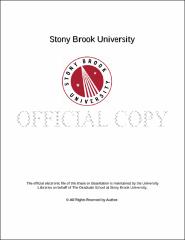| dc.identifier.uri | http://hdl.handle.net/11401/76199 | |
| dc.description.sponsorship | This work is sponsored by the Stony Brook University Graduate School in compliance with the requirements for completion of degree. | en_US |
| dc.format | Monograph | |
| dc.format.medium | Electronic Resource | en_US |
| dc.language.iso | en_US | |
| dc.publisher | The Graduate School, Stony Brook University: Stony Brook, NY. | |
| dc.type | Thesis | |
| dcterms.abstract | Experimental assessments of species vulnerabilities to ocean acidification are rapidly expanding, yet the potential for short- and long-term adaptation to high CO2 by contemporary marine organisms remains poorly understood. We used a novel experimental approach that combined bi-weekly sampling of a wild, spawning fish population (Atlantic silverside, Menidia menidia) with standardized offspring CO2 exposure experiments and parallel pH monitoring of a coastal ecosystem. We assessed whether offspring produced at different times of the spawning season (April-July) would be similarly susceptible to elevated (~1,100 uatm, pHNBS = 7.77) and high CO2 levels (~2,300 uatm, pHNBS = 7.47). Early in the season (April), high CO2 levels significantly (P < 0.05) reduced fish survival by 54% (2012) and 33% (2013) and 1-10d post hatch growth by 17% relative to ambient conditions. However, offspring from parents collected later in the season became increasingly CO2-tolerant until, by mid-May, offspring survival was equally high at all CO2 levels. This interannually consistent plasticity coincided with the rapid annual pH decline in the species' spawning habitat (mean pH: 1 April/31 May = 8.05/7.67). It suggests that parents can condition their offspring to seasonally acidifying environments, either via changes in maternal provisioning and/or epigenetic transgenerational plasticity (TGP). TGP to increasing CO2 has been shown in the laboratory but never before in a wild population. Our novel findings of direct CO2-related survival reductions in wild fish offspring and seasonally plastic responses imply that realistic assessments of species CO2-sensitivities must control for parental environments that are seasonally variable in coastal habitats. | |
| dcterms.available | 2017-09-20T16:49:38Z | |
| dcterms.contributor | Baumann, Hannes | en_US |
| dcterms.contributor | Gobler, Christopher | en_US |
| dcterms.contributor | Nye, Janet. | en_US |
| dcterms.creator | Murray, Christopher S. | |
| dcterms.dateAccepted | 2017-09-20T16:49:38Z | |
| dcterms.dateSubmitted | 2017-09-20T16:49:38Z | |
| dcterms.description | Department of Marine and Atmospheric Science. | en_US |
| dcterms.extent | 91 pg. | en_US |
| dcterms.format | Application/PDF | en_US |
| dcterms.format | Monograph | |
| dcterms.identifier | http://hdl.handle.net/11401/76199 | |
| dcterms.issued | 2014-12-01 | |
| dcterms.language | en_US | |
| dcterms.provenance | Made available in DSpace on 2017-09-20T16:49:38Z (GMT). No. of bitstreams: 1
Murray_grad.sunysb_0771M_11864.pdf: 1501168 bytes, checksum: 9d7a66f1f413784e5213408f4d9176ea (MD5)
Previous issue date: 1 | en |
| dcterms.publisher | The Graduate School, Stony Brook University: Stony Brook, NY. | |
| dcterms.subject | Biological oceanography | |
| dcterms.subject | Atlantic silverside, Flax Pond, larvae, menidia menidia, ocean acidification, transgenerational plasticity | |
| dcterms.title | Does the seasonal acidification of spawning habitat influence offspring CO2 reaction norms through transgenerational plasticity in the coastal fish species, Menidia menidia? | |
| dcterms.type | Thesis | |

